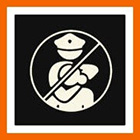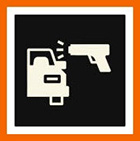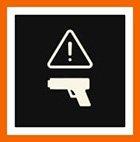Police Reform Initiative
These pages provide a high-level summary of Clemson University policies relating to critical issues in policing. Much of this work addresses the major calls for reform being demanded in other cities. It also represents a significant investment by the Clemson University community in an accountable police department.

CHOKEHOLDS BANNED: YES.
RESPONSE TO RESISTANCE POLICY IV-04, PAGE 5
CUPD policy IV-04 prohibits the use of any neck or carotid restraint, including chokeholds.
COMPREHENSIVE USE OF FORCE REPORTING: YES.
RESPONSE TO RESISTANCE POLICY IV-04, PAGE 6
CUPD policy IV-04 requires that officers clearly and reliably report and thoroughly document each time they use force of any type. The public has access to this data through the agency’s public dashboard. After any use of force situation, officers complete a use of force report that is reviewed by supervisors, commanders, and senior leaders. Based on the review, the chief of police can ask for an internal investigation to clarify questions or address violations.


REQUIRED TO EXHAUST ALL OTHER MEANS BEFORE USING LETHAL FORCE: YES.
LESS LETHAL AND LETHAL WEAPONS POLICY IV-11, PAGE 8 SECTION III
CUPD policy IV-11 provides that lethal force may be used in circumstances where a threat of death or serious physical injury to the officer or others is imminent and only when no reasonably effective alternative exists. Officers are required to exhaust all other alternatives, including non-force and less lethal force options, prior to resorting to deadly force.
FORCE DECISION MAKING MODEL: YES.
RESPONSE TO RESISTANCE POLICY IV-04, PAGE 3-4
CUPD policy IV-04 requires that officers assess and modulate the use of force as resistance changes. CUPD has implemented ICAT (Integrated Communication, Assessment, and Tactics training for all officers. It teaches officers to continually assess a situation and use critical thinking skills to choose the appropriate level of force, not simply move up or down a force continuum.


REQUIRES DE-ESCALATION: YES.
RESPONSE TO RESISTANCE POLICY IV-04, PAGE 4 AND LESS LETHAL AND LETHAL WEAPONS POLICY IV-11, PAGE 1-2
CUPD policies IV-04 and IV-11 require that, where safe and feasible, officers use de-escalation tactics so that more time, options, and resources are available to resolve the situation. All CUPD officers are training in the ICAT Model which focuses on de-escalation by gathering available information, assessing the best course of action, developing a plan, and slowing down the situation. It provides officers the opportunity to gather additional resources and put distance between them and any threat. De-escalation techniques include talking to a subject, keeping a distance, or even just taking a pause before reacting. This type of training involves the acquisition of effective communication and active listening skills.
DUTY TO INTERVENE: YES.
CUPD policy IV-04 requires that employees intervene in dangerous or criminal conduct or abuse, or face discipline. Additionally, CUPD has joined the Active Bystandership for Law Enforcement (ABLE) Project which teaches officers how to intervene in situations to protect citizens, officers, and organizations. This research-based program teaches officers skills in how to recognize situations that could go wrong and how to step in to prevent citizen and officer injuries. Likewise, it helps agencies create a culture of respect, peer intervention, and safety.


NO SHOOTING AT MOVING VEHICLES: YES.
LESS LETHAL AND LETHAL WEAPONS POLICY IV-11, PAGE 9 SECTION VI, SECTION VII
CUPD does not allow officers to shoot at people in a moving vehicle. Shooting at or from a moving vehicle is dangerous to both officers and others. It is virtually impossible to shoot with responsible accuracy and control from a moving vehicle, such actions are prohibited unless absolutely necessary in defense of life and then only as a last resort. The substantial risks generated by the use of gunfire against moving vehicles, in combination with the likelihood that such gunfire will fail to achieve its goal, demand that officer’s resort to firing only in the most extreme and exceptional circumstances.
PROHIBITS NO-KNOCK WARRANTS: YES.
SEARCH AND SEIZURE POLICY III-04, PAGE 13
CUPD’s policies and training are consistent with "knock and announce” guidance and prohibits no-knock warrant service except in very limited circumstances and requires approval by the Chief of Police. This does not include a 911 response call that involves exigent circumstances, such as a 911 emergency.


GIVE WARNING BEFORE SHOOTING: YES.
RESPONSE TO RESISTANCE POLICY IV-04, PAGE 5 AND LESS LETHAL AND LETHAL WEAPONS POLICY IV-11, PAGE 8
CUPD policies IV-04 and IV-11 require that officers shall, when feasible, issue a verbal warning to the subject and fellow officers prior to discharging a firearm.
INDEPENDENT INVESTIGATIONS OF OFFICER-INVOLVED SHOOTINGS: YES.
CUPD requires that all officer involved shootings is investigated by the State Law Enforcement Division (SLED). While this is not a requirement by law, it is a best practice which CUPD has embraced. Once the initial investigation is completed by SLED, the case is reviewed by the Circuit Solicitor to determine any legal findings. Independent investigations for serious incidents are important to creating trust and transparency which are important elements in building solid relationships within community.


NO QUOTAS ON ENFORCEMENT: NONE.
The Clemson University Police Department does not evaluate officer or commander performance based on specific enforcement numbers, including arrests and stops. There are no numerical enforcement quotas established by the Clemson University Police Department.
BODY WORN CAMERAS REQUIRED: YES.
In 2017, CUPD completed its roll out of its body worn camera program. These cameras supplemented existing in-car dashcams. Body -worn cameras assist law enforcement agencies in various ways, they improve evidence collection, strengthen officer performance and accountability, enhance agency transparency, document encounters between police and the public, and assist with resolving issues associated with citizen complaints and officer- involved incidents.


FILMING POLICE ALLOWED: YES.
CIVIL DISTURBANCE OPERATIONS POLICY III-06
The Clemson University Police Department fully supports all First Amendment rights and government transparency. Policy III-06 states that filming is allowed. This protection covers recording law enforcement officials who are carrying out their duties.
IMPLICIT BIAS TRAINING: YES.
FAIR AND IMPARTIAL POLICING POLICY II-15, CHAPTER II
The Clemson University Police Department requires all employees to participate in a variety of trainings to address implicit bias, systemic racism, and bias-free policing. CUPD has an extensive policy outlining how to ensure policing is provided equitably and incidents of bias are documented and investigated.


FEDERAL REPORTING OF USE OF FORCE DATA: YES.
CUPD is a participant and reports as required by the program.
